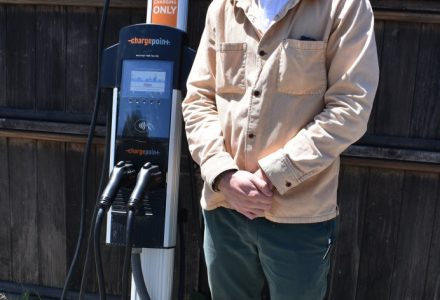Published on 07/13/2022
Article snippet: The following is a press release composed by written by Suzanne Pletcher: Matt Kammerer, chef and director of the Harbor House Inn in Elk, installed the first EV charger in Mendocino County through the Sonoma Coast Incentive Project, which aims to install more EV chargers in the county [Photo provided by Suzanne Pletcher] More than $2 million generated from two programs of the California Energy Commission (CEC) have been awarded to fund the purchase and installation of public electric vehicle (EV) charging stations in Mendocino County over the next few years. The grants are the first of several rounds aimed at blanketing Mendocino County–and the state—with public EV chargers in support of Governor Gavin Newsom’s 2020 executive order requiring that all new cars sold in California by 2035 be zero emission. “We know from a recent facilities energy audit that the biggest source of carbon emissions for county operations is our vehicle fleet, so we want to provide an electric charging infrastructure that allows us to switch from gas to electric county vehicles,” said Mendocino County Fourth District Supervisor Dan Gjerde. “A secondary hope is that by installing public EV chargers we will give people confidence that they can purchase an electric vehicle and find a place to charge it.” Rural EV Charging Program The County received a $655,702 grant from the CEC’s Clean Transportation Program Rural EV Charging program for 24 public charging stations at county facilities in the City of Ukiah, four at the social services office parking lot on South State Street and 20 at the county administration complex at Low Gap Road. The County added a $170,000 match to the grant from the $2 million it allocated on Aug. 3 when it unanimously adopted the county’s Carbon-Free Mendocino resolution. Since the EV chargers will be installed in Ukiah, the county will qualify for a $48,000 rebate from the city’s utility, and the rebate will be earmarked for later rounds of grant funding to expand the network of EV charging stations to other facilities throughout the county, said Janelle Rau, the county’s general services agency director. Gjerde said the public can pay for using the EV chargers during daytime office hours. County-owned vehicles would charge at night. The County is upgrading its vehicle fleet with vendor Enterprise Fleet Management to hybrid electric vehicles that can be traded in for plug-in electric vehicles as the EV charging infrastructure is installed over the next few years. Sonoma Coast Incentive Project A second CEC program, the Sonoma Coast Incentive Project, allocated $718,500 for rebates to Mendocino County businesses, tribes, low-income housing developers, shopping centers and public entities such as libraries that install level 2 and fast-charger (DCFC) public stations at their properties outside the City of Ukiah. Public power provider Sonoma Clean Power is a funding partner in that project. “Compared with similar programs, this one is generous. It covers construction costs, installation costs, and the equipment, so this program essentially funds up to three-quarters of the total cost of adding an electric vehicle charger to a property,” said Brant Arthur, program manager at Sonoma Clean Power. A public Level 2 EV charger at Harbor House Inn in Elk on the Mendocino coast was the Incentive Project’s first installation in Mendocino County. The inn also offers a Tesla charger. “It’s been great,” said Matt Kammerer, the inn’s chef and executive director. “At Harbor House, sustainability is at the forefront of what we do, and we are always looking for the next step.” Kammerer applied to the program because he wanted to ensure that customers could drive their electric cars to the inn and charge there for the trip back home. His latest step was to enroll in Sonoma Clean Power’s EverGreen service to ensure that his EV chargers refuel electric vehicles with 100% renewable energy from local solar and geothermal projects. Launched in July of 2020 and quickly oversubscribed, the Sonoma Coast Incentive Project has allocated money for EV chargers in Fort Bragg, Point Arena and Willits, although exact locations won’t be revealed until installations are completed. Rebates for Level 2 chargers start at $5,000 and, for DCFCs, $50,000. Thirty-one percent of funds are reserved for chargers serving disadvantaged and low-income communities in Mendocino County. “There’s a lot of money in the pipeline that is coming either through the state of California or through the bipartisan Federal Infrastructure Act that is targeting installation of more EV chargers,” said Arthur. “In rural Mendocino County, people often drive more, and the cost of transportation as a percent of income also goes up. Having a solution for electric vehicle charging that is cost-effective and reliable should be available to everyone.” Sonoma Clean Power is adding another $800,000 in local funding to support building high speed chargers along rural highways that may have missed the first round of funding or that are near multi-family housing for low-income residents. Fast-Chargers Funded for Mendocino Coast The CEC also awarded $506,400 to EV Charging Solutions, Inc., a Los Angeles business, for turnkey installation of public EV chargers at hotels spaced about 20 miles apart along Mendocino County’s coastal Highway 1. Senior Sales Manager Jessie Guo said the company contributed an additional $126,600 and will install one level 2 and two DCFCs at Elk Cove Inn in Elk, one level 2 and 2 DCFCs at Seafoam Lodge in Little River, and one level 2 and 4 DCFCs at the Holiday Inn Express in Fort Bragg. A second statewide round of $500 million in funding from the California Energy Commission is expected to help Mendocino County further expand its EV charging network....
